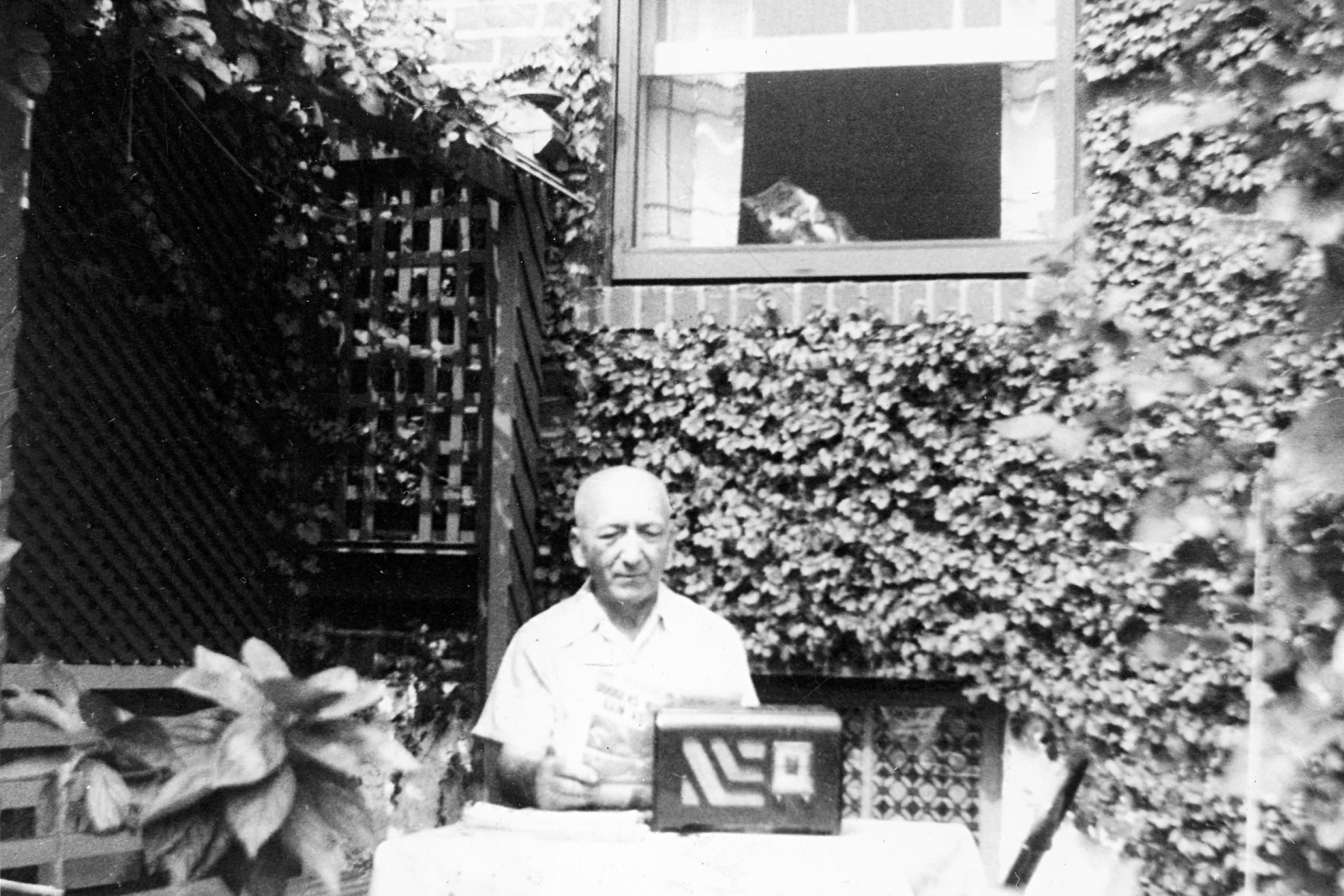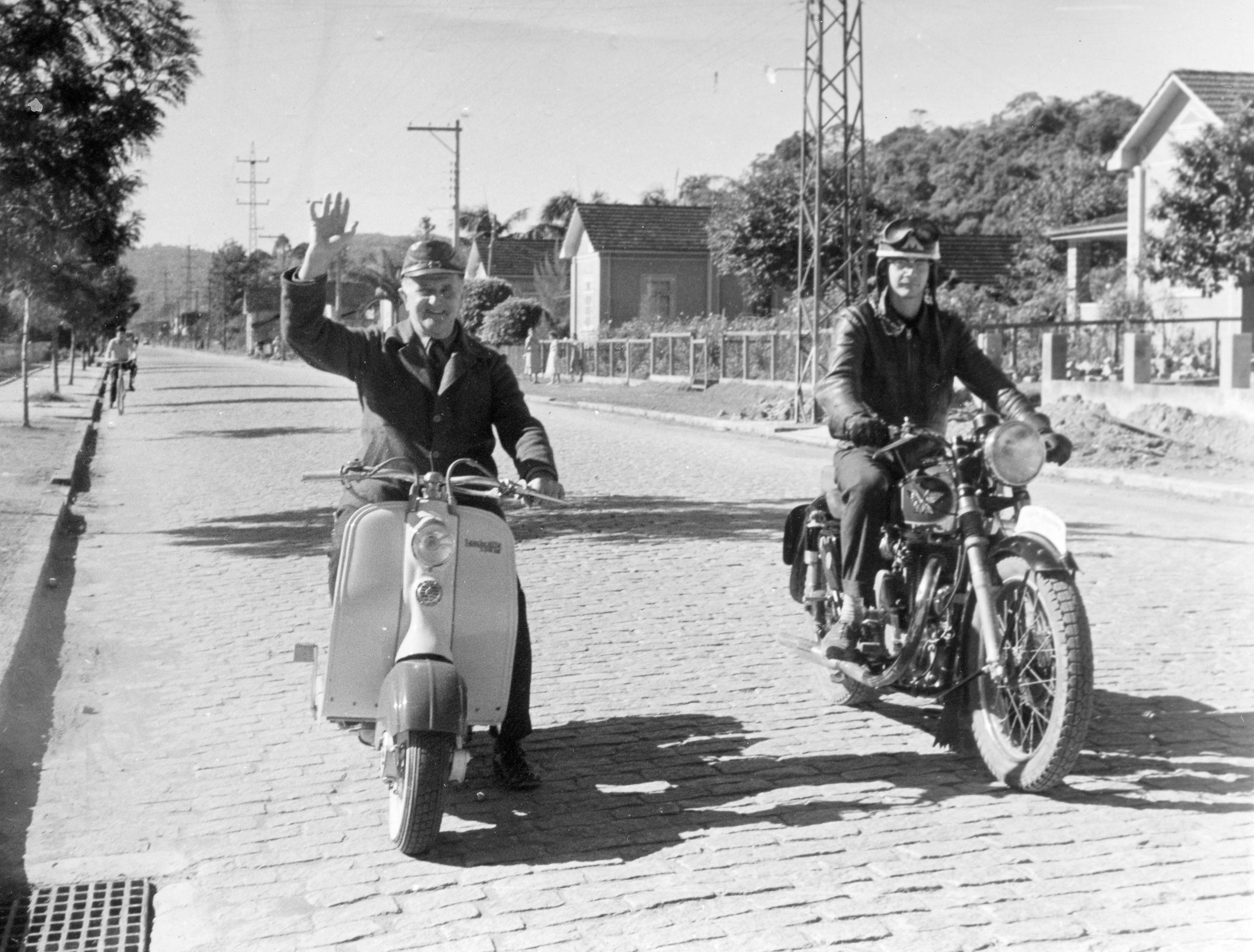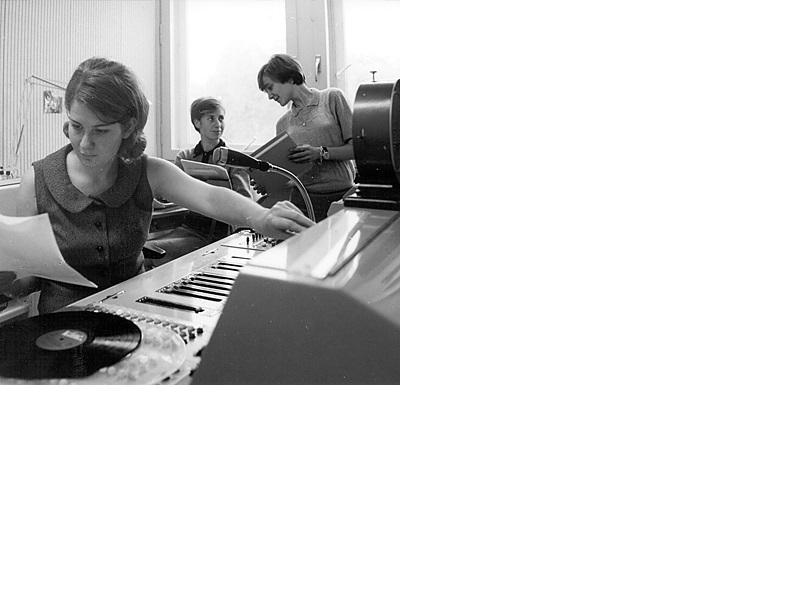Switzerland’s international voice in a changing world

The Swiss Shortwave Service and later Swiss Radio International (SRI) broadcast from the heart of Europe from 1935 until its closure in 2004. Now researchers are going through the records, letters and recordings to see how Swiss identity played out over the airwaves.
“Can you feel the history in these documents?” says Fanny Gutsche, research assistant at the Seminar for Cultural Anthropology at the University of Basel, as she turns the pages of an internal memo from the Swiss Shortwave Service governing body, dated 1968. It was the year of the Prague Spring, when the Soviet Red Army crushed a Czechoslovakian revolt.
“They were thinking of establishing a Czech service…news or programmes that would address the Czech audience. They were doing some research into whether it would be successful or not,” she explains. A few news programmes were broadcast, but they were a short-lived reaction to a political event and did not continue for long.
Giving a global listenership impartial information on world events during the Cold War was at the heart of the radio station’s mission during this key time for the service. Showing that Switzerland was strong and independent was important. But the idea of ‘Swissness’ in a wider sense – what it meant to be Swiss or to truly experience Switzerland – was also central to the programmes and the music the station put out across the globe. The radio station wanted to show Switzerland’s best side to the world.
As the 1968 memo notes, the programming for a Czech audience was to avoid being political.
A few topics from a typical broadcast included “blood donations, the Red Cross, the postal service and asylum policy in Switzerland”. Reaction to the short-lived experiment was slim – mainly due to censorship, Gutsche believes, based on this archive material.
“It says that the letters of listeners from Czechoslovakia are censored. They got one that had been opened by a censor in Czechoslovakia, but it was still sent on to the radio station. That was the only reaction they got…maybe there were more letters [that did not make it].”
Sensing the times
“Switzerland was surrounded by very strong countries, so they wanted to present that they were also a strong country and that they could defend themselves,” says Gutsche.
She and others are tackling the vast archives of the radio service that preceded the Swiss Broadcasting Corporation’s current international service, swissinfo.ch. At its peak, it broadcast in seven main languages: English, German, French, Italian, Spanish, Portuguese and Arabic, with occasional short-term or one-off programmes in others.
“At this time, television was not yet the most important mass media form – radio and especially shortwave broadcasting in an international context, was the most important form for keeping in contact over a huge distance,” says Patricia Jäggi, another researcher from the University of Basel working on the Broadcasting Swissness project.
“During the first decades of the Cold War, the 1950s and 60s, the radio station got more money from the state and the broadcasting corporation – they could develop and become a bigger institution,” says Gutsche.
“In the early years it was more a station for the Swiss abroad; it played lots of folk music and used Swiss German dialects. Then later in the 60s it became more professional, more international and wanted to be a really professional international radio service, like the BBC World Service.”
Gutsche has stacks of letters and documents from SRI separated out by decade in her office in Basel. The piles grow larger for the 1950s and 60s, and then shrink again towards the end of the 1990s up to the point where the station stopped broadcasting in 2004.

More
From Brazil, Tanzania, Morocco, Australia with love
“The listeners listened because they believed it was a neutral voice from Europe,” she adds. After the fall of the Berlin wall in 1989, this appeal became less unique.
United strength
In contrast to the temporary delve into Czech broadcasting, the connection between the station and its listeners worldwide was generally strong. Part of the service’s aim was to maintain unity among the Swiss wherever they were. Letters came in, many filled with emotion, such as one written in German from New Jersey, received in the late 1930s.
“When I hear the old singers and yodellers I feel homesick and it brings tears to my eyes, even though I am 67 years old and have been here for 50 years,” the listener wrote.

More
The fife flute from Ilgau, canton Schwyz
These kind of letters were typical says Gutsche. “Really, really often I read letters like this…Swiss people who live abroad became very emotional when they listened to the broadcasts from Swiss Radio International.”
They were keen to take part in activities that could bring them closer to this ideal image of Switzerland, such as the radio’s worldwide shooting festival, a global competition set up by the station that ran seven times from the late 1930s to the 1960s. Target shooting with rifles is a part of Swiss military training and competitions also run throughout the country for those with an interest and an eye for detail.
Being able to defend yourself with a rifle could be seen as a part of the concept of ‘Swissness’, according to the researchers. Something very Swiss, and with a long tradition behind it. The Swiss legend of William Tell stems from his ability to shoot an apple off his son’s head in the face of an oppressor – with a bow and arrow, not a rifle, of course.
Digital records
The archive of more than 12,000 sound recordings from 1935 to 2004 was digitised and catalogued in a joint project by Swiss Radio International, now swissinfo.ch, and MemoriavExternal link, the association for the preservation of the audiovisual heritage of Switzerland.
“In every ‘Swiss colony’ in a foreign country, everybody could take part in the contest,” says Gutsche, referring to the Swiss communities abroad. “They sent the results to Bern, to the studio, by telegram, and they chose the worldwide winner.” Around 20-30 countries took part.
Swiss perception
Presenting Switzerland to the world was a task carefully thought through by the station’s producers and radio journalists. Programming varied from language to language. News and current affairs always featured and music played an important role – it was partly Swiss music, partly music that was popular at the time such as jazz or big band tunes in the 1950s. Culture, music festivals and sport were included, more so at weekends.
“It was always at the meeting point of Switzerland and the world. On the one hand they wanted to send a message about Switzerland to the world, on the other they wanted listeners to understand or be attracted [to the station]…they had to know what listeners were interested in,” says Gutsche.
Listener letters were analysed in a special department and trips were undertaken to radio stations around the world to see what type of programming listeners in other places expected.
“The station projected a stereotypical image until the 1960s, when they wanted to become more international…then they wanted to say ‘we are Switzerland, we don’t just have mountains, cheese and chocolate, we also have science, industry, innovations,” says Gutsche.
Programmes such as ‘Don’t just stay here, do something’, tried to bring alive different layers of experiencing Switzerland.

More
Hop on board a bobsled
“They were also always looking for things people didn’t know…things off the track, which were not in every guidebook about Switzerland,” said Jäggi. “They always said they were trying to bring a Swiss reality to people worldwide…and I found this really touching that they were so passionate about the job.”
Interested and want to find out more? You can contact the author of this article, Jo Fahy, on twitter @jofahyExternal link and on FacebookExternal link.
Broadcasting Swissness archive project
The research team is looking at how ‘Swissness’ – the idea behind what it means for something or someone to be Swiss – is constructed through the programmes and the politics of the Swiss Shortwave Service and later, Swiss Radio International (SRI).
Researchers from the Universities of Basel and Zurich, and the Lucerne University of Applied Sciences and Arts are examining different aspects of the radio station’s archives, including documents, recordings, speech-based programming and music.

In compliance with the JTI standards
More: SWI swissinfo.ch certified by the Journalism Trust Initiative


You can find an overview of ongoing debates with our journalists here. Please join us!
If you want to start a conversation about a topic raised in this article or want to report factual errors, email us at english@swissinfo.ch.